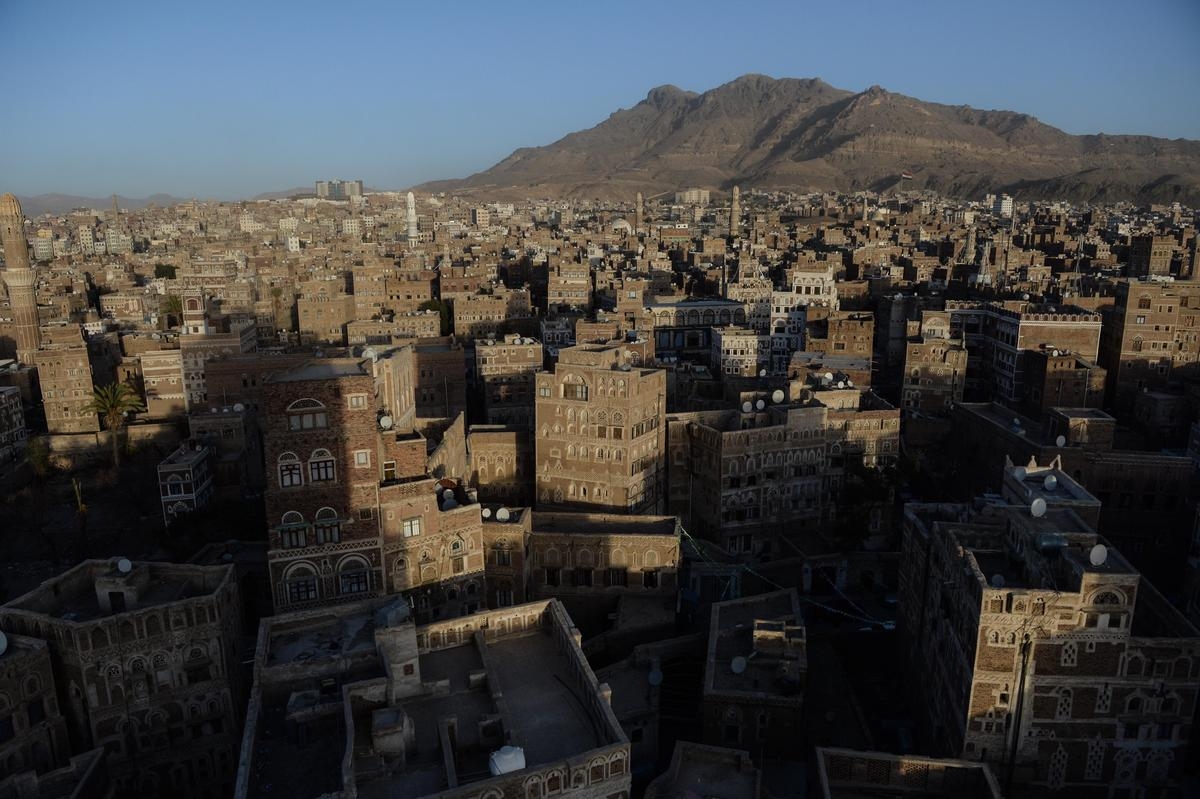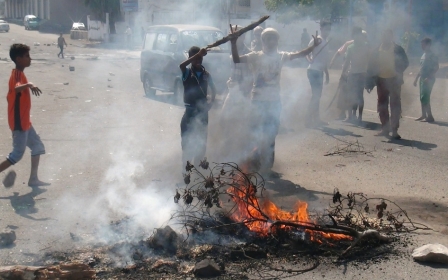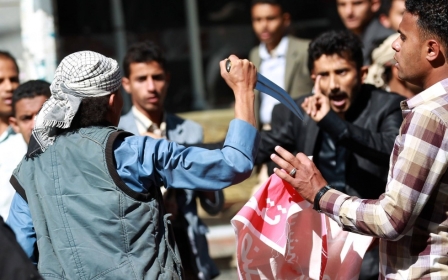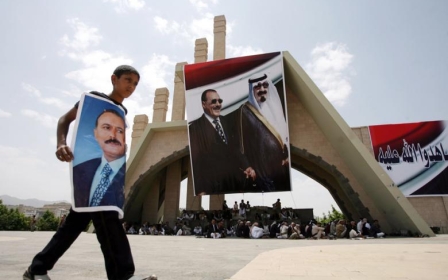Yemen unrest forces investors overseas

Sana'a, Yemen - Six-year-old Sameh al-Abhashi awoke on Monday trembling. Outside the window of his father’s apartment in Yemen’s capital Sanaa, he could see a column of smoke rising above the houses. Gunfire rattled nearby, and an ambulance siren wailed. He was petrified.
Sameh and his family live in the shadow of Nahdain, two mountains that overlook the heavily fortified presidential palace in Sanaa. Last week, after a fierce gunfight with the guards of President Abd Rabbuh Mansour Hadi, the palace was seized by militiamen loyal to the Houthis, a predominantly Zaydi Shiite group from northern Yemen.
“My wife and kids had to hide in the basement of the house,” said Mohammed al-Abhashi, Sameh’s father, a businessman working in the construction industry who was in Dubai at the time. “I couldn't sleep... My son was crying on the phone fearing that something might happen to them,” he said.
On Thursday evening, after two days of fighting and with Hadi under virtual house arrest, the president, his prime minister and entire cabinet resigned, further crushing hopes for a democratic transition in Yemen.
Al-Abhashi, who has lived in Yemen his entire life and stayed throughout the unrest of 2011, said he is now considering leaving. “As a businessman, I want a safe environment, and right now Yemen is far from that, not for me or my family and kids.”
“I am moving to the US next month. My kids will follow me after they have finished school,” he said.
Al-Abhashi is not the only one. Middle East Eye spoke to several local and foreign investors this week who, in the face of a crumbling government, a Shiite insurgency and a spike in suicide bombings by al-Qaeda in the Arabian Peninsula, are moving their investments overseas to the US, Malaysia and neighbouring Gulf countries.
‘Without hope’
A week before Monday’s attack, Hassan al-Ahdal stood in his office in Burj Aman, Sanaa’s financial hub, and stared glumly out the window.
“I have no hope for 2015,” said al-Ahdal, his hands in his pockets. “Or 2016.”
Though unwilling to disclose an exact figure, the 42-year-old operations manager at Yemen Kuwait Bank said that “millions of dollars had been retracted from the Yemeni market and invested abroad.”
Inspired by protests in Egypt and Tunisia, young men and women in Yemen filled the streets in 2011 to oppose the 33-year rule of Ali Abdullah Saleh. As well as calling for freedom and social justice, many Yemenis demanded an end to corruption that has left millions jobless and the economy in tatters.
Today, almost two years since Saleh stepped down, four international airlines have closed, return on investment rates have sunk from 12 percent in 2011 to 8 percent, and embassies are evacuating foreign nationals.
In 2013, investor Abdo Elfgeeh returned to Yemen from New York to start a snack food factory. His plan: produce and sell affordable potato chips.
Overrun by optimism with a slight economic recovery of 4.8 percent in 2013, according to the World Bank, Elfgeeh invested a fourth of his capital in Ajial company, a factory producing 10oz bags of potato chips. He said he did his research, identifying a demand wasn't being met, and was confident investment would flow in from fellow business partners: Yemenis living in the US.
But as the political uncertainty increased, his chances of securing the investments dwindled. Eight months later, the burnished new equipment in his factory remains unused.
“Looking at the situation, I’m having to reconsider my decision - either find new partners or relocate to New York. I’ve been using my savings for nearly eight months. I cannot continue like this. I’m in debt," Elfgeeh said.
“It’s not only me - businesses, banks, schools and hospitals have taken a massive hit."
African, Turkish and GCC alternatives
Some of the investors, cautiously hopeful, have turned to short-term investments in the real estate sector and stock markets in Turkey and neighbouring GCC countries. Others are in long-term trading and industrial projects in Africa, predominantly in Ethiopia and Djibouti.
Yemen’s Saba Islamic and Cooperative and Agriculture Credit bank (CAC) has opened branches in Djibouti. Similarly, sources at Yemen Kuwait Bank and Sanaa-based Tadhamon International Islamic bank said that they are also investigating investing in Africa.
The governments of Djibouti and Ethiopia, for their parts, have offered Yemeni investors tax concessions, free land, and other perks.
Yahya Mohsen, chairman of the General Investment Authority (GIA), a national agency facilitating investments in Yemen since 1992, dismissed claims about the decline in investments in the country as ‘inaccurate”.
“There are no official statistics to prove the exact numbers of companies leaving the country. It’s only talk,” said Mohsen.
While a GIA investment report showed a 40 percent decline from 2013 to 2014 in registered projects, the capital invested increased by more than $465,4780 total.
But Mohsen added that these numbers do not reflect the oil and banking sectors, in accordance with the Investment law, which excludes investments in oil, gas, minerals, banking and exchange from the data. Instead, the numbers cover agricultural and industrial services, and tourism.
Despite the crisis, Yemen’s GDP grew to 5.1 percent from 4.4 in 2013, according to the IMF World Economic Outlook 2014. A source at CAC bank said: “People didn’t want to repeat the same foolish mistakes from 2011, that’s when the GDP fell considerably. This time, not all have moved their money."
Houthis: multiplier or divider?
“The main factor is the militia,” Elfgeeh said. “The security forces took one step back and allowed the militia to lead. These people are not trained, unprofessional and have enemies who want to hurt them, so how can we expect the situation to improve?”
Al-Ahdal blames all political parties involved. “If everyone was doing their job, the Houthis would not find a power vacuum to operate,” he said.
But Ahmed Alakwar, in Sanaa’s Old City, said the environment for his telecommunication business had improved with the Shiite rebels in control. “At least now I have regular electricity and I feel the protection and security," he said.
“With the government, there was nothing. So quickly, we’ve seen some progress. In the future, it will be better under the Houthis."
Al-Abhashi said that in recent months, the Houthis increased burdens on the state's treasury and created an unhealthy atmosphere for investors to enter the market or continue their business.
Since the Houthis took over the capital in late September, they stormed government offices, rampaged through universities, media offices, and plundered the homes of journalists, including the house of Nobel peace laureate Tawakkol Karman.
Apart from the Houthis, Elfgeeh cites foreign interference as a key concern for the country’s economy. “I cannot ignore the foreign factors. I am suspicious of foreign intelligence as they make Yemen a battlefield for their conflicts.
“The latest one being French intelligence and Total [the French oil and gas company], we suspect have been co-operating with the Houthis. Now the Houthis have replaced Safer oil company with their own people,” he said.
While the investment in a foreign country will benefit the business, the status quo of Yemeni people remains unchanged. After four years of political wrangling, more than 54 percent of people – or 14 million Yemenis - live below the poverty line, i.e. between $1.25 and $2.
“Ten million Yemenis do not have enough to eat, including 850,000 acutely malnourished children,” said Grace Ommer, Yemen’s country director, on Oxfam’s website.
But banks and investors remain largely indifferent, and Al-Ahdal said banks are left with little choice but to protect themselves and their clients in the absence of a government.
Disconcerted by what he sees as warring factions with selfish agendas, Al-Abhashi is keen on a new life and business elsewhere. “I suspect it will take us five years [for Yemen to rebound], maybe more, I don’t know anymore,” he said.
New MEE newsletter: Jerusalem Dispatch
Sign up to get the latest insights and analysis on Israel-Palestine, alongside Turkey Unpacked and other MEE newsletters
Middle East Eye delivers independent and unrivalled coverage and analysis of the Middle East, North Africa and beyond. To learn more about republishing this content and the associated fees, please fill out this form. More about MEE can be found here.




